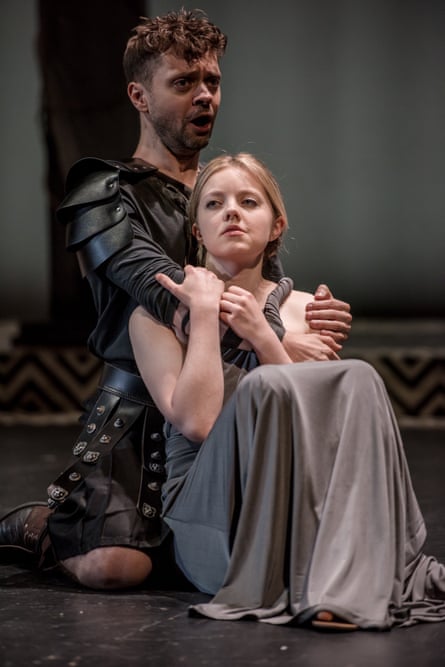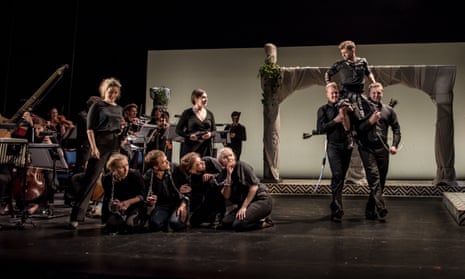Being the highest paid artist in Christendom is no guarantee of posterity. Who, baroque specialists aside, can name anything by the Venetian composer Antonio Caldara (1670-1736), a prolific employee of the Holy Roman Emperor Charles VI, with numerous stage works to his name? Buxton international festival, ever committed to presenting the unfamiliar, has surpassed its own recondite standards this 40th anniversary year with a staging of his Lucio Papirio Dittatore (1719). An epic tale of love and strife in pre-imperial Rome, it was premiered in Vienna 300 years ago and probably hasn’t been performed since. It may also be the first professional staging of any Caldara opera in the UK.
The score was reconstructed – every instrumental and vocal part realised and made playable – by the violinist Adrian Chandler, director of the baroque ensemble La Serenissima and clearly a man of indefatigable energy. This is a long work.
It’s no surprise to find the plot turns on a people’s vote that goes the wrong way, and a law-abiding dictator’s wish to overturn it for the greater good. Sense prevails. All ends, after several potential endings, it must be said, with a hymn to benign dictatorship in general, and the superior powers of the Holy Roman Emperor in particular.
In Buxton, a top cast tackled this work with enthusiastic commitment. As the army leader who offends the dictator, countertenor Owen Willetts (Quinto) has the best music and sang his showpiece arias with dazzling fervour. His love duet with the ever affecting Rowan Pierce (Papiria), when he faces death, was a heartfelt centrepiece. Robert Murray, William Towers, Elizabeth Karani, Eleanor Dennis and Gareth Brynmor John all shone, supported by a lean, lively chorus. Apparently Charles VI, and there’s no accounting for taste, liked fugues. Caldara provides a couple, complete with lusty trumpets and drums.

The tireless musicians of La Serenissima, led by Chandler and positioned to the side of the stage, were on their feet throughout. Lucky continuo players – harpsichord, cello, theorbo – who got to sit. Chandler himself dispatched his many explosive violin solos with verve, his right arm in perpetual frenetic motion to deal with the fizzing scales and rapid bowing techniques. If there’s a fair amount of thin, baroque-style padding and yards of “secco” recitative, the cascade of star arias for the seven soloists shows why Caldara could command a fortune. Director Mark Burns and designer Kitty Callister kept the production simple, the set consisting of allusions to antiquity – arches, statuary – wrapped up Christo-style. They didn’t find a way to deal with the challenges of da capo arias, with all their repeats, but let’s leave that for another day, another stage. These singers deserve further chances to perform this rarity they’ve worked so hard to master.
Twenty new pieces played by different ensembles and a chance to hear each twice over in one sitting: this is the capacious aim of the New Music Biennial, a free three-day collaboration between the PRS Foundation and London’s Southbank (you can listen on Radio 3’s New Music Show), repeated in Hull this weekend. Sampling five hours of this marathon, I heard works refreshingly diverse in scale and approach. The biennial may not define new music, as the tagline promised, but who can, or should? Openness is the imperative.
Rolf Hind’s Tiger’s Nest, for percussion, two pianos and gamelan, takes its title from a cliffside Buddhist monastery in the mountains of Bhutan. The whispered, ethereal sounds of two prepared pianos and the ever delicate gongs, bells (some formidable work from percussionist Colin Currie) and gamelan chimes, created a sense of this precipitous edifice, and its sacred purpose. In noisy, upbeat contrast, Sam Eastmond’s Brit-Ish, performed by the big band Spike Orchestra, drew on radical Jewish culture. Klezmer sounds tame in comparison.
The video games composer Jessica Curry addressed female power in She Who, a radiant, catchy work for the National Youth Chamber Choir. Curry noted that, as a woman in the games industry, she had been subject to death and rape threats. Writing for these young singers was fruitful artistically, and a relief. Sona Jobarteh united the west African sounds of calabash, balafon and kora with amplified violin, cello, bass and electric guitar to exuberant, poetic effect. The baritone Roderick Williams found time in his busy singing career to write three jazzy, upbeat songs – setting poems from Chris Beckett’s Ethiopia Boy – for Chineke! Orchestra, with himself as soloist.

Two installations ran all weekend: in Requiem for the 21st Century, the Iraqi composer Khyam Allami suspended eight ouds in a circle, amplified to act as loudspeakers, transmitting gorgeous, unearthly sounds of plucked strings and fragmented voices (the chorus of Opera North): haunting and mesmeric. Music for Seven Ice Cream Vans by Dan Jones, merged the jingle-jangles of ice-cream vans into an aural, outdoor soundscape. A full-scale domestic row took place in front of the van I was near, a man jumping in and out of his van, a woman stalking off. It turned out to have nothing to do with the installation but added true grit to the sweet aural sprinklings and siren peals of a Southbank summer.
Star ratings (out of five)
Lucio Papirio Dittatore ★★★★
New Music Biennial ★★★★
There is one more performance of Lucio Papirio Dittatore at Buxton Opera House on Thursday 18 July
The New Music Biennial continues in Hull today, 14 July

Comments (…)
Sign in or create your Guardian account to join the discussion